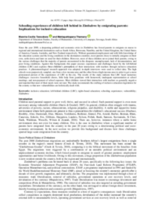Abstract
Since the year 2000, a deepening political and economic crisis in Zimbabwe has forced parents to emigrate en masse to regional and international destinations such as South Africa, Botswana, Namibia, and the United Kingdom, the United States of America, Canada, Australia, and New Zealand respectively. Without guaranteed employment and with little knowledge of the education systems and the living conditions in the destination countries, most parents chose to initially emigrate on their own, settle down and later on send for their children. However, most of these children never joined their parents, owing to the various challenges that the majority of parents encountered in the diaspora: unemployment, lack of documentation, and poor living conditions. Against this background, this paper assesses experiences and challenges faced by the left-behind children (LBC) and explores these children’s perceptions of their interactions with teachers through inclusive education practices. A phenomenological research approach was adopted; in-depth interviews were used to collect data. The high schools were purposively sampled, one from a low-income area and the other from a high-income area in order to get a more pronounced picture of the experiences of LBC in the city. The results of the study indicate that LBC faced numerous challenges: excessive household chores, little help from guardians with homework, inadequate representation at school meetings, and non-payment of school expenses. Most children viewed their interaction with teachers as generally negative and reported that most of their needs were not met. The study recommends the crafting of inclusive education legislation for the country so that new vulnerabilities are holistically dealt with.

